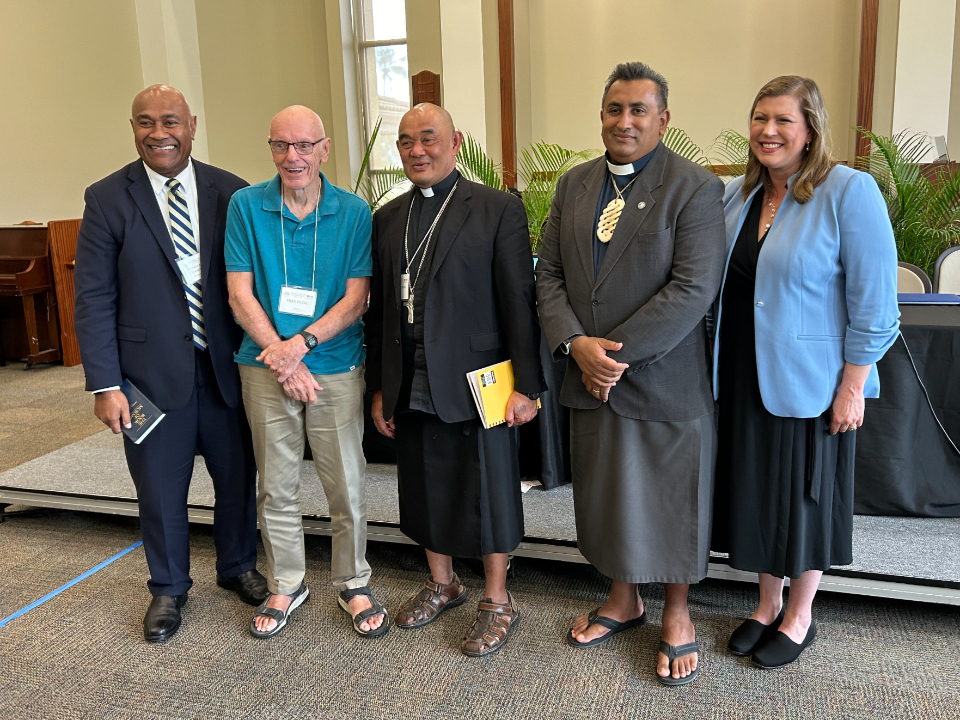Speaking to the delegates, convenors and students attending the Oceanian Perspectives on Human Dignity Conference held at Brigham Young University–Hawaii on 25-26 April 2024, Elder Taniela B. Wakolo, General Authority Seventy and a member of the Pacific Area Presidency of The Church of Jesus Christ of Latter-day Saints, asked, “What is another way of spelling human dignity?”
“It is L-O-V-E,” he said, in answer to his own question.
Elder Wakolo continued, “I love the Māori proverb, which I believe was penned with ‘L-O-V-E’ and ‘unity in diversity’: “He aha te mea nui o te ao? What is the most important thing in the world? He Tangata, he tangata, he tangata. It is people, it is people, it is people.”
He continued, “We are all sons and daughters of God. Understanding this doctrine will change our attitude and behaviour towards humanity, bar none.”
Delegates from across the Pacific gathered for the two-day conference, which aimed to expand understanding of how human dignity is addressed from a variety of Oceanian perspectives including law, religion, culture, and community.
 DOWNLOAD
DOWNLOADThe first panel discussed human dignity and faith traditions in Oceania. Elder Taniela Wakolo presented alongside fellow Christian leaders, Reverend James Shri Bhagwan, General Secretary, Pacific Conference of Churches; Reverend Dr. Peter Loy Chong, Archbishop of Suva, Fiji; and Father Francis X. Hezel, a Jesuit Priest from Micronesia.
Academics, lawyers, government leaders, religious leaders, and human rights advocates discussed human dignity perspectives in the island nations of Tonga, Fiji, Cook Islands, Samoa and New Zealand; as well as Hawaii and Guam.
Presentations were made about human dignity and the media in Oceania, as well as religion and civil society.
At the end of the conference, Brett Scharffs, Director, International Center for Law and Religion Studies, offered the concluding remarks.
He expressed appreciation for Elder Wakolo’s call to “strive for unity in diversity.”
“Elder Wakolo reminded us of the priority of the two great commandments, to ‘love God with all our might, mind and strength,’ and to ‘love our neighbours,’” Scharffs said.
In his remarks, Scharffs shared a few quotes on human dignity from the conference that stood out to him.
Reverend James Shri Bhagwan said, “Love is expressed in public spaces as justice.”
Reverend Dr. Peter Loy Chong said, “Human dignity is based in our community and our clan. It is not an individual thing that we can do by ourselves.”
“Human dignity is universal. Unless it becomes universal, it becomes useless,” said Father Francis X. Hezel.
Dr. Natasha Khan said, “Human rights naturally spring from human dignity, even in places [which] are wary of human rights and western values.”
Loukinikini Vili Lewaravu said, “Human dignity is preserved and promoted through a robust legal framework and human dignity is preserved and promoted through culture.”
Honourable Maualaivao Pepe Seiuli said, “Human dignity for everyone everywhere helps us understand the scope and meaning of human rights.”
Honourable Robert J.Torres said, “Our commitment to human dignity is what defines us.”
“Every panel was filled, brimming with similar depths of human insight,” Scharffs said.
- 2024-Oceanian-Perspectives-on-Human-Dignity-Conference
- 2024-Oceanian-Perspectives-on-Human-Dignity-Conference
- 2024-Oceanian-Perspectives-on-Human-Dignity-Conference
- 2024-Oceanian-Perspectives-on-Human-Dignity-Conference
- 2024-Oceanian-Perspectives-on-Human-Dignity-Conference
- 2024-Oceanian-Perspectives-on-Human-Dignity-Conference
- 2024-Oceanian-Perspectives-on-Human-Dignity-Conference
- 2024-Oceanian-Perspectives-on-Human-Dignity-Conference
| Temple Square is always beautiful in the springtime. Gardeners work to prepare the ground for General Conference. © 2012 Intellectual Reserve, Inc. All rights reserved. | 1 / 2 |
The conference was sponsored by Brigham Young University–Hawaii, International Center for Law and Religion Studies, J. Reuben Clark Law School, Brigham Young University, Provo, and The Church of Jesus Christ of Latter-day Saints.
At the end of the conference there was a desire among participants to reprioritise human dignity across the Pacific. A committee was formed to consider principles for a call to action that delegates might use to encourage others to make human dignity a unifying force for good throughout the region.